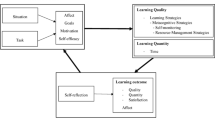Abstract
This descriptive research aims to explore the student perceptions about technology and their resilience when they develop mathematical problems through digital technologies. The population was 19 students, who had allowed to use geogebra software and matrixcalc application to verify problem solving. The study is supported by the theories of self-determination, connectivism and social construction of knowledge. The methodology is a combination of proposals of Hattie et al. named by [4, 6] and of the authors. A survey with a reliability coefficient of 0.81 was distributed to students, obtaining that more than half of them perceive themselves as capable of achieving their goals, maintaining their sense of humor, feeling the family support, controlling the development of activities, considering the authorized programs that are easy to use, useful and reliable. So, the academic strategy used favors the development of academic resilience, which is consistent with the postulates of Vaquero [9].
Access this chapter
Tax calculation will be finalised at checkout
Purchases are for personal use only
Similar content being viewed by others
References
Nazihatulhasanah, A., Nurbiha, A.: The effects of GeoGebra on students achievement. Procedia Soc. Behav. Sci. 172, 208–214 (2015)
Bozkurt, G., Ruthven, K.: Classroom-based professional expertise: a mathematics teacher’s practice with technology. Educ. Stud. Math. 94, 309–328 (2017)
Olsson, J.: The contribution of reasoning to the utilization of feedback from software when solving mathematical problems. Int. J. Sci. Math. Educ. 1, 1–21 (2017)
Matzenberger, J.: A novel approach to exploring the concept of resilience and principal drivers in a learning environment. Multicult. Educ. Technol. J. 7, 192–206 (2013)
Narciss, S.: Designing and evaluating tutoring feedback strategies for digital learning environments on the basis of the interactive tutoring feedback model. Digit. Educ. Rev. 23, 1–26 (2013)
Faber, J.M., Luyten, H., Visscher, A.J.: The effects of a digital formative assessment tool on mathematics achievement and student motivation: results of a randomized experiment. Comput. Educ. 106, 83–96 (2017)
Savolainen, T., Ikonen, M., Nurmenniemi, H.: Trust and resilience in entrepreneurial perspective: empirical findings from the developments in entrepreneurs’ stories. In: 11th European Conference on Innovation and Entrepreneurship, Aaltio, liris and Tunkkari-Eskelinen, Minna, pp. 726–733 (2016)
Jülich, S.: Towards a local-level resilience composite index: introducing different degrees of indicator quantification. Int. J. Disaster Risk Sci. 8, 91–99 (2017)
Vaquero, E., Urrea, A., Mundet, A.: Promoting resilience through technology, art and a child rights-based approach. Rev. Cercet. Interv. Soc. 45, 144–159 (2014)
Coronado-Hijón, A.: Academic resilience: a transcultural perspective. Procedia Soc. Behav. Sci. 237, 594–598 (2017)
DeHann, C., Hirai, T., Ryan, R.: Nussbaum’s capabilities and self-determination theory’s basic psychological needs: relating some fundamentals of human wellness. J. Happiness Stud. 17, 2037–2040 (2015)
Skinner, E., Pitzer, J.: Developmental dynamics of student engagement, coping, and everyday resilience. In: Christenson, S.L., et al. (eds.) Handbook of Research on Student Engagement, vol. 1, pp. 21–44. Springer (2012)
Durairaj, K., Umar, I.: A proposed conceptual framework in measuring social interaction and knowledge construction level in asynchronous forum among university students. Procedia Soc. Behav. Sci. 176, 451–457 (2015)
Song, S., Doll, B., Marth, K.: Classroom resilience: practical assessment for intervention. In: Prince-Embury, S., Saklofske, D.H. (eds.) Resilience in Children, Adolescents, and Adults: 61 Translating Research into Practice. The Springer Series on Human Exceptionality, vol. 1, pp. 61–72. Springer Science + Business Media, New York (2013)
Di Maggio, I., Ginevra, M., Nota, L., Soresi, S.: Development and validation of an instrument to assess future orientation and resilience in adolescence. J. Adolesc. 51, 114–122 (2016)
Kumar, S.: Integrating cognitive antecedents into TAM to explain mobile banking behavioral intention: a SEM-neural network modeling. Inf. Syst. Front. 1, 1–13 (2017)
Almaiah, M., Jalil, M., Man, M.: Extending the TAM to examine the effects of quality features on mobile learning acceptance. J. Comput. Educ. 3, 453–485 (2016)
Bazelais, P., Doleck, T., Lemay, D.J.: Investigating the predictive power of TAM: a case study. of CEGEP students’ intentions to use online learning technologies. Educ. Inf. Technol. 1, 1–19 (2017)
Ngai, E.W.T., Poon, J.K.L., Chan, Y.H.C.: Empirical examination of the adoption of WebCT using TAM. Comput. Educ. 48, 250–267 (2007)
Davis, F.D.: Perceived usefulness, perceived ease of use, and user acceptance of information technology. MIS Q. 13, 319–340 (1989)
Liébana-Cabanillas, F., Sánchez-Fernández, J., Muñoz-Leiva, F.: Antecedents of the adoption of the new mobile payment systems: the moderating effect of age. Comput. Hum. Behav. 35, 464–478 (2014)
Pulgar, L.: Factores de Resiliencia presentes en estudiantes de la Universidad del Bío Bío, sede Chillán. http://cybertesis.ubiobio.cl/tesis/2010/pulgar_l/doc/pulgar_l.pdf
Broche, Y., Rodriguez, B., Pérez, S., Santaella, G., Díaz, A., Hernández, A., Blanco, Y.: Escala de Resiliencia Connor y Davidson (CD-Risk). In: Feijóo, S. (eds.) Validación de Instrumentos Psicológicos: Criterios Básicos, vol. 1, pp. 71–75 (2012)
Wu, M.-C.Yang, F.: An empirical investigation of habitual usage and past usage on technology acceptance evaluations and continuance intention. ACM SIGMIS Database 39, 48–73 (2008)
Author information
Authors and Affiliations
Corresponding author
Editor information
Editors and Affiliations
Rights and permissions
Copyright information
© 2018 Springer International Publishing AG
About this paper
Cite this paper
Guerra, L., Rivero, D., Arciniegas, S., Quishpe, S. (2018). Digital Feedback and Academic Resilience. In: Rocha, Á., Guarda, T. (eds) Proceedings of the International Conference on Information Technology & Systems (ICITS 2018). ICITS 2018. Advances in Intelligent Systems and Computing, vol 721. Springer, Cham. https://doi.org/10.1007/978-3-319-73450-7_95
Download citation
DOI: https://doi.org/10.1007/978-3-319-73450-7_95
Published:
Publisher Name: Springer, Cham
Print ISBN: 978-3-319-73449-1
Online ISBN: 978-3-319-73450-7
eBook Packages: EngineeringEngineering (R0)




